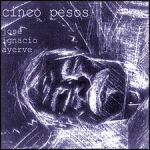Rock ’n’ Español
Ayerve’s alt-language debut
Some solo artists go to greater lengths than others when distancing themselves from their former or current bands. Dave Navarro’s recent effort wasn’t too dissimilar from work he’d done with Jane’s Addiction or Red Hot Chili Peppers: heavy guitars, straightforward rock ’n’ roll. But then you have Sting, who’s gone from punk rock Police hero to a pale imitation of Elton John, picking up Golden Globes for syrupy love-song movie themes.
Locally, Darien Brahms has distinguished herself as more of a folk/indie-rocker since the Latin/jazzy Munjoy Hill Society called it quits. But Sara Cox stayed pretty much in the Coming Grass vein with her emo-roots solo EP.
Spouse frontman and Bullyclub sideman José Ayerve has gone a step further than most with his new solo EP: He’s recorded the whole thing in Spanish.
 “In order to get away from Spouse loyalty,” says Ayerve, “I felt like I had to dive into that whole Spanish portion of my background to steer around the notion that ‘This could be a Spouse song,’ or ‘This could be a Bullyclub song.’ ”
“In order to get away from Spouse loyalty,” says Ayerve, “I felt like I had to dive into that whole Spanish portion of my background to steer around the notion that ‘This could be a Spouse song,’ or ‘This could be a Bullyclub song.’ ”
The result is Cinco Pesos, a six-song effort long in the making and worthy of the time spent.
“I finished it back in January of last year,” says Ayerve. “I did it all and had it ready to master. It was just a matter of having no money. After a while it just got irritating having this disc that was supposedly finished, so finally I was just like, ‘Fuck it, I’ll figure out the money later.’ ”
Good thing for Portland fans. Those who enjoyed Spouse’s latest, Nozomi, will find the new EP familiar in its guitar tone, Ayerve’s hushed vocals, and songwriting that’s just slightly ahead of the pop curve. And the language shouldn’t be too foreign, as Nozomi’s best song was probably the all-Spanish “Ni Una Sola Vez” — distorted guitars supporting a cool Latin swing.
It is that Spanish sentimentality that distinguishes this project from Ayerve’s others. It could have been gimmicky, had the songs been merely indie-rock standards with Spanish lyrics, but the tunes manage to stand firmly on their own Latin feet.
The opener (attributed to José Alfredo Jiménez), “Amenecí en Tus Brazos,” leads with some spacey distortion, but settles in nicely with a spare set of vocals, Leonard Cohen-style, over a bass/strum/strum Spanish merry-go-round rhythm. While the organization of the song is a pop verse/chorus/bridge arrangement, Ayerve inserts other elements to help the tune feel authentic: an echo to the voice track, a pause midway to emit a plaintive wail.
If the disc had remained that subdued, it might have gotten tiresome — much like Cohen’s most recent Ten New Songs — but the follow-up track is much more rockin’. There is a quick bluegrassy G-run to get your attention, then some salsa percussion as a foundation. The title, “Primavera,” is a fitting one — though it inspires initial pasta references for Anglocentrics — reminding a snowed-in listener of warmer climes and budding spring.
That will be half the fun for some listeners: How much of my seventh- and eighth-grade Spanish or Latin classes can I use to figure out what the heck he’s saying? You’ll certainly catch familiar snippets. “Mi amor,” sticks out on the duet Ayerve crafts with Anne Viebig on “Siempre Capaz,” an operatic ballad. And you’ll catch phrases like “gringo Americano” on the pistolero-filled “Los Ángeles,” what Ayerve describes as a story about “someone trying to make their way out of Mexico.”
“I think for some strange reason it’s easier for me to tell a story in Spanish,” he says. “Because I translate all the time it’s easier for me to find words that sound more like they should be together. Lyrics in Spanish are not as frequent, but they’re almost more fluid.”
They sound most fluid on “Cohete,” a relative burner that closes the disc out. A rapid guitar run precedes angry vocals like Latin punk-lite reminiscent of early Replacements or REM. The muted guitars that form the coda blanket barking dogs, lending a DIY quality like that found on the early Sublime discs.
Just as American rock ’n’ roll is sung in English the world over by Russians (Remember metal-heads Gorky Park?), Swedes (ah, ABBA), and whomever, Ayerve’s Spanish vocals seem to inspire him to create a rock/rumba hybrid that is completely his own.
“It’s easier to sing in Spanish when there’s something there reminding me of it,” he says. “I can’t just write this indie-rock song and throw some Spanish lyrics on top of it.”
Of course, the question remains: How are we to interpret this? Would a Spanish audience analyze this like any other indie-rock album? Is it, like instrumental jazz, meant only to be interpreted by English-speaking audiences here in Portland as music and the emotion it evokes? Ayerve hedges a little.
“If I were to play a show in front of an audience that were completely Spanish speaking,” Ayerve admits, “I wouldn’t feel less valid, but I’d feel a little more self-conscious. There’s a certain degree of artistic freedom that I’m taking because I know very well that most of my audience is going to be primarily English speaking and it’s easier to impress upon them.
“It’s one thing to speak Spanish inside the classroom,” he says with a grin in his voice, “it’s another thing to get from Machu Pichu to Mexico City.” Knowing that the disc will get some play on college and local stations’ “Latin Hour” (or however it’s billed), Ayerve hopes to get some feedback from Spanish listeners on how the disc stands as a Spanish work.
“Maybe it will be constructive.”


